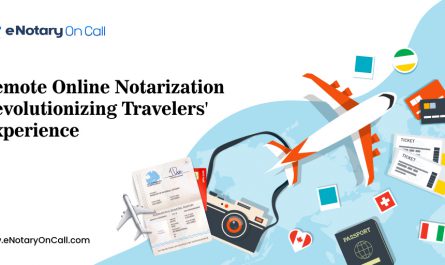The world is going digital. We turn to online solutions, from banking to healthcare, for innovative convenience and efficiency. Notarization is no exception. Remote Online Notarization (RON) in the US has changed the face of document notarization, providing the most convenient and efficient means of closing transactions.
But with every digital transformation comes a most common question: Is it secure?
Many individuals and businesses are concerned about the integrity of their sensitive documents, the risk of fraud, and whether remote online notarization is as legally binding as traditional in-person methods.
In this blog, we will set the record straight, separating fact from myth with concerns commonly raised about the security of the best RON platform for notaries in the USA and how modern digital technology protects the notarization process.
Whether you are in the legal, real estate, government, or financial industry, the pressure to make the right security moves with a remote online notarization platforms becomes a vital component of informed decision-making.
So, without any further ado, let’s get started!
RON Security: Why it Matters?
The process of notarization helps to ensure that signatures are genuine and that every party does what they promised to do. It also ensures that documents are tamper-proof and legally recognized—a legal contract, a real estate deed, or a financial agreement. The Best Remote Online Notarization Services in the USA include multi-layered security measures that meet or exceed those of traditional notarization methods.
Building Trust with Remote Online Notarization Platform Security
A secure best notarization process fosters trust between businesses, clients, and institutions. Secure identity verification, encrypted storage, and robust audit trails in the best RON and electronic notary platforms like eNotary On Call lend trust that every transaction is legally binding and fraud-proof.
Myth vs. Reality: Debunking Common RON Security Concerns!
First, let’s clear up the misconception about RON security. Below are some common myths debunked with facts:
Myth 1: RON is Simpler to Fabricate Than Traditional Notarization
Reality:
The current notarization process is heavily paper-based, relying on their physical presence, and still susceptible to forgery. However, best RON platform in the USA utilizes identity verification technologies like:
- Credential analysis – Verifies that IDs issued by the government are legitimate.
- Knowledge-based authentication (KBA) – Asks personal questions only the signer can answer.
- Video verification — Records real-time interaction that is almost impossible to mimic.
Due to these multi-step verification processes, remote online platforms are even more secure than traditional methods.
Myth 2: My Data Is Exposed on the Internet
This is a severe issue and with good reason. This is where reputable best RON platform, such as eNotary On Call, know how to prioritize data security.
Reality:
- Documents are scrambled and illegible to unauthorized individuals.
- Data is carried through highly secure and geographically redundant data centers.
- Industry best practices maintain data centers.
- eNotary On Call is compliant with specific regulations:
- SOC 2
- HIPAA (where applicable)
- Relevant state-specific regulations
Myth 3: Video Recordings are Easily Manipulated
Reality:
The most crucial component of RON seems to be the video recording of the notarization sessions, which is an audit trail against fraud. These recordings are:
- Making changes noticeable, stamped, and insulated in the bank.
- Such codes are reviewed in case of disputes, giving them a legal foundation.
- Encrypted and only accessed where appropriate.
A traditional notarization does not record evidence; hence, top RON platforms like eNotary On Call are better for transparency.
Myth #4: RON Is Not Legally Binding
Reality:
- Under U.S. laws, RON is fully recognized.
- Uniform Electronic Transactions Act (UETA)
- Electronic Signatures in Global and National Commerce Act (ESIGN Act)
“Several states have passed laws authorizing RON platform, and federal legislation continues to expand RON acceptance.” Documents notarized through a RON retain the same legal standing as fy-but-notarized documents.
Myth #5: Everyone Has Access to My Notarized Documents
Reality:
Unlike paper notarizations, which can be misplaced or stolen, the cheapest RON platform, eNotary On Call, provides tight access controls:
- Documents are kept in secure cloud-based repositories.
- Only authorized parties (notary, signer, and approved stakeholders) can access them.
- Tamper-evident seals make unauthorized alteration impossible.
Whenever your documents remain encrypted and legally protected step by step — as RON focuses on security and privacy.
The Benefits of Remote Online Notarization Platforms
Beyond its robust security features, RON offers a wealth of additional benefits:
- Efficiency and Speed – Remote Online Notarization Platform like eNotary On Call saves valuable time for busy professionals—no more scheduling appointments or traveling to a physical notary.
- Convenience and Accessibility – Notarize documents, which is best in the USA, from anywhere, anytime, with an internet connection.
- Cost Savings – Reduce travel expenses, printing costs, and potentially notary fees.
- Enhanced Record Keeping – Digital records are easier to manage, store, and retrieve than paper documents.
Also read – How Are Mobile Notarization Apps Making Document Notarization Easier Than Ever?
eNotary On Call: Your Trusted Partner for Secure RON
We at eNotary On Call, realize that security is imperative in the world of online notarization. That’s why we build our platform to the best security standards available so you can rest assured knowing that your documents and transactions are safe.
Security Features of eNotary On Call
- Strong identity verification via multi-factor authentication.
- The tamper-evident technology guarantees the integrity of the documents.
- Complete audit trails for transparency and legal compliance.
If you work in real estate, law, finance, or government, our platform offers:
- Solutions for fast and secure notarization
- Adherence to state laws and industry regulations.
- Effortless integration into existing workflows.
Conclusion
Common remote online notarization platfomr security myths have been debunked — you can be assured that rigorous measures are in place to secure your data and documents.
When selecting your best RON platform in the USA, choose a secure provider like eNotary On Call to maintain your notarization’s integrity and validity. We’re dedicated to keeping RON comfortable, seamless, and secure for you while you rest assured knowing your documents are in good hands.
FAQs
Is Remote Online Notarization Legal in All States?
RON has been legalized in many states, and more adopt it yearly. Check with your state’s regulations or get guidance at eNotary On Call.
Is it Valid to Use Best RON Platform for a Real Estate Transaction?
Yes! RON is increasingly used for mortgage signings, deeds, and other real estate documents.
How Does Remote Online Notarization Platform Provide Identity Verification?
RON platforms use government ID, knowledge-based authentication (KBA), and video recording to verify identity.
Is My Notarized Document Stored Safely and Securely?
Absolutely. This will allow RON documents to be encrypted, safely stored, and access-controlled.
How do I Get Started with eNotary On Call?
Register, upload your files, and talk to a certified notary—all from the comfort of your home!
Which States Allow Remote Online Notarization?
Most U.S. states, including Alabama, Alaska, Arizona, Arkansas, Florida, Illinois, Colorado, and Georgia, allow Remote Online Notarization (RON) and recognize Electronic Notary Platforms. However, always verify with the specific state’s Secretary of State for the most current regulations.



